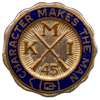

|
A Tribute to Cadets
by David P. Sorokoty, KMI 1972 SAE - The Record, Vol. 132, Issue #3, 2013 Like most first-year cadets that passed through the door to the Old Ormsby Plantation and its stately mansion with towering white pillars, I had no idea what was in store for me the next three years. Rather, upon entering through a picturesque front gate and driving down a long narrow road lined with tall maple trees and large fields of manicured grass, I was too busy contemplating what I had got myself into. You see, I was starting my adventure as a Kentucky Military Institute cadet, and this was the embarkation point for the journey. The military school was steeped in history and known for its motto of “Character Makes the Man.” Founded in 1845 by Colonel Robert Thomas Pitcairn Allen, KMI was the third military academy to become chartered in the United States. The sleepy little Kentucky town of Lyndon would see its fair share of generals, statesman, governors, business pioneers and even a couple of movie actors over the next 75 years. KMI also maintained a winter campus in Venice, Florida, since administrators believed that ideal weather conditions for the entire academic school year would make for a superior learning experience. But my experience took place in 1969, the last years of this storied institution. With the Vietnam War raging and national feelings turning away from the military, the school’s population sharply fell off. I graduated in 1972, and my first days were met with fear and some excitement. As I stepped onto the campus for the first time, I was not aware that every minute of every hour of every day during the school year was already planned for me and my next three years. Our day depended on bugle calls that were played from the guard house. We woke up with reveille and ended the day with taps. We spent Monday through Friday in class for six hours with most afternoons devoted to drill, the time to practice for the parade every Sunday. Outside class and study hall at night, our time was devoted to the military — from field-stripping our issued M1 rifle and room inspections to marching in formation and paying attention to detail on our uniforms. We spent free time among sports that were offered like football, baseball, swimming, golf and our rifle team to name a few. On Wednesday afternoons, we were allowed to walk to Lyndon. Saturday after morning inspection, we had the day off, which meant we could hop a bus to Louisville. You can imagine how long our meager weekly allowance of $2.50 would last. However, we had to leave in uniform. And, of course, when a busload of us left to go to an Iron Butterfly concert at Rupp Arena, we had to be in our military uniforms. It wasn’t to our liking, but as cadets, we had no other options. The only exception to having free time involved demerits or penalty points if we broke the rules. A cadet once remarked that we could become gardeners working off our demerits. In fact, one infraction of AWOL equaled 100 hours of extra work after classes, so I think cadets with that many demerits could become master gardeners. With a few hundred male teenagers living together 24 hours a day, we enjoyed our share of campus pranks, much to the chagrin of our peers. We used to paint the cannon out front many different colors, just in time for homecoming or graduation. And one of my favorites was playing “Whole Lotta Love” by Led Zeppelin over the loud speakers at midnight from the guard house, which seemed to wake everyone in the county. My fellow cadets and I laughed it off as good, clean fun. But as we made our way through the early 1970s, we could see our old school was taking a beating. Paint started to chip away from the once proud buildings that adorn the campus. School enrollment dropped below 300 for the first time and my graduating class had only 28 men. At graduation, I could not help but think of the past cadets who took that step on to the front porch of Ormsby Hall to receive their coveted diploma. That step, worn by the weather — and featuring a pronounced dip from foot traffic over the years — is where a boy cadet turned in to a man. The school finally closed after a long but proud history in 1974. I have created a page on Facebook titled Kentucky Military Institute, which serves to preserve the history, recall fond memories and rekindle friendships of the brotherhood we shared. You’re invited to stop by and take a look at facebook.com/kentuckymilitaryinstitute. David Sorokoty, one of the last cadets to graduate from Kentucky Military Institute, maintains a Facebook page for his alma mater. This photo circa 1970 shows other cadets in formation outside a campus building. |
 |
Kentucky
Military Institute www.kmialumni.org Send e-mail to: kmimail@kmialumni.org Copyright © All rights reserved. |
 |